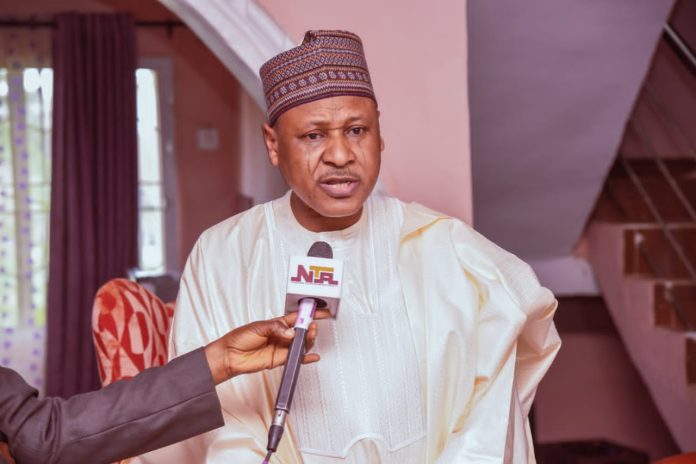Federal Government says it will not retrench workers in the course of the implementation of the 12-year-old Steve Oronsaye report.
The Minister of Information and National Orientation, Mohammed Idris, made this known during the Ministerial Press Briefing on Wednesday in Abuja.
He said “,The essence of the implementation of the Oronsaye report is not to retrench workers, but to maximise the effectiveness and efficiency of the agencies, and to also reduce cost.
“There are some aspects of the report that have been reviewed; but those aspects that have to do with merging, scrapping and subsuming have already been undertaken.
“Now, the whole idea is that government wants to reduce cost and improve service delivery.

Pix- Idris
“That does not necessarily mean that government is out to retrench workers and throw people into the labour market. That is not the original intention of government.
“The intention is that efficiency has to be brought in, because, some of these agencies are actually having an overlap in their operations. We are doing this for people to have the benefit of democracy,” Idris said.
The Federal Executive on Monday approved the Implementation of the recommendations of the Oronsaye panel on the restructuring and rationalisation of Federal Government’s agencies and commissions.
The government said the implementation of the policy would involve the merging, subsuming and scrapping of agencies with similar functions.
In April 16, 2012, the committee submitted an 800-page report identifying, amongst several other things, overlapping agencies, causing wastage in expenditure.
The committee said there are 541 parastatals, commissions and agencies and recommended that 263 of the agencies should be reduced to 161, 38 agencies abolished and 52 merged.
There were some motion without movement on the report during ex-President Muhammadu Buhari eight years in office but the new government said implementing the report aligned with its cost-cutting measures.
The National Emergency Management Agency is to be merged with the National Commission for Refugee Migration and Internally Displaced Persons; the Directorate of Technical Cooperation in Africa is to be merged with the Directorate of Technical Aid and to function as a department in the Ministry of Foreign Affairs.
The Infrastructure Concession Regulatory Commission will be merged with the Bureau for Public Enterprises; the Nigerian Investment Promotion Commission to be integrated into the Nigerian Export Promotion Council as the National Agency for Science and Engineering Infrastructure will now be one with the National Centre for Agriculture Mechanisation and Project Development Institute.
Also, the National Biotechnology Development Agency will be amalgamated with the National Centre for Genetic Resource and Biotechnology, the National Institute for Leather Science Technology with the National Institute for Chemical Technology and the Nomadic Education Commission with the National Commission for Mass Literacy, Adult Education and Non-formal Education.
The Federal Radio Corporation will be merged with the Voice of Nigeria; the National Commission for Museum and Monuments with the National Gallery of Arts; the National Theatre with the National Troupe of Nigeria and the National Metrological Development Centre with the National Metrological Training Institute.
In a similar vein, the Nigerian Army University, Biu, Borno will now function as a faculty within the Nigerian Defence Academy while the Air Force Institute of Technology will become a faculty of the Nigerian Defence Academy.
The Service Compact with Nigeria, popularly known as SERVICOM, has been subsumed to function as a department under the Bureau for Public Service Reform; the Border Communities Development Agency becomes a department at the National Boundary Commission while the National Salaries Income and Wages Commission was subsumed into the Revenue Mobilisation and Fiscal Allocation Commission.
The Institute for Peace and Conflict Resolution was subsumed under the Institute for International Affairs; the Public Complaints Commission under the National Human Rights Commission; the Nigerian Institute for Trypanosomiasis into the Institute for Veterinary Research; the National Medicine Development Agency under the National Institute for Pharmaceutical Research and Development and the National Intelligence Agency Pension Commission under the Nigerian Pension Commission.
The Niger Delta Power Holding Company has been relocated to the Ministry of Power; the National Agricultural Land Development Agency to the Federal Ministry of Agriculture and Food Security; the National Blood Service Commission has been converted into an agency and relocated to the Federal Ministry of Health even as the Nigerian Diaspora Commission becomes an agency at the Federal Ministry of Finance
Author- Maureen Ikpeama